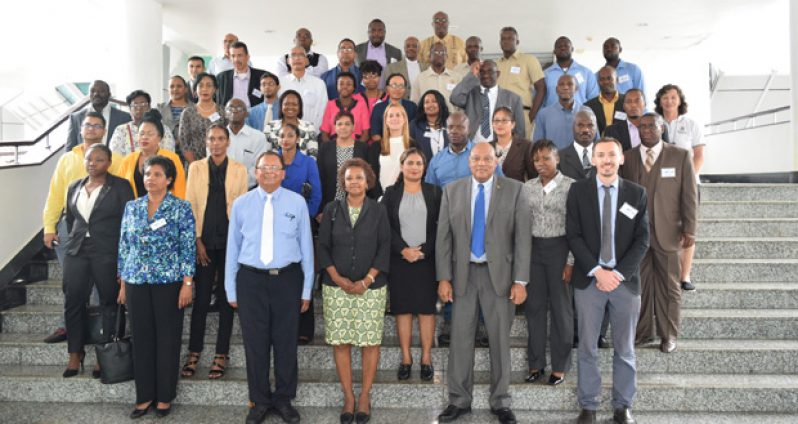By Ariana Gordon
More emphasis needs to be placed on neglected development minerals, Minister of Natural Resources and the Environment Raphael Trotman said Monday. Trotman was at the time speaking to more than 40 participants of the first regional training workshop on environment, community, health and safety in development minerals at the Arthur Chung Convention Centre, Liliendaal, East Coast Demerara.
He told the gathering of public and private sector representatives, non-governmental organisations and miners from Guyana, Trinidad and Tobago, Suriname, Haiti, Jamaica and the Dominican Republic that Guyana, like other Caribbean territories, has paid too much attention to gold, diamond and bauxite and “has neglected other valuable resources that are waiting to be explored and exploited”.
“Little or no attention is being paid to the source of salt that flavour our food. We ask what about the limestone that sets our concrete walls, the aggregate and the sand that pave our roads, the pigments that colour our paints, or the coloured stones that give beauty and glamour to jewellery and accessories,” Minister Trotman said.
He noted that in the context of globally declining mineral prices, one positive side effect has been the shift in the spotlight towards the group of lesser known, neglected development minerals, which are intrinsic to everyday life.
“We believe that construction materials, dimension stones, industrial minerals and semi-precious stones are the hidden bedrock of our societies and the people that mine them in many parts of the world are humble small scale miners.”
Trotman thanked the European Union (EU) for their contribution of over euros 13 million to aid in the development of the sector.
The minister noted that the mining sector contributes significantly to poverty reduction and local development, and in Guyana’s case; the economy is projected to grow by 4.1 per cent this year. He said the growth is being projected on the basis of a construction boom and mining activities.
Government, the minister added continues to promote the business potential of the country’s significant deposits by engaging manufacturers.
He disclosed that there is an estimated 15 million tonnes of jasper located within a 10-mile radius of Orinduik, Potaro, Region 8. Additionally, he noted that the region is rich in semi-precious stones and other neglected minerals.
UNDER EXPLOITED
Further, Minister Trotman noted that the regulations, policies and institutional capacities governing the sector require much strengthening.
“Collectively, these factors serve to hinder productivity and growth in the sector and I am happy we are addressing them frontally now.”
The minister applauded the support from the African Caribbean and Pacific States (ACP), the EU and the United Nations Development Programme (UNDP), stressing that development of neglected minerals can assist in poverty reduction and aid in creating employment for many.
Assistant Secretary General, Human and Social Development, Caricom, Dr Douglas Slater in brief remarks told participants that the Caricom Secretariat, through its Secretary General, Irwin La Rocque, believes that initiatives such as the Development Minerals Programme, which are being implemented in partnership with the ACP, UNDP, EU, Caricom and the Government of Guyana “go a long way towards building a country’s capacity, to identify and grow new fostering investments”.
He said such programmes aid in achieving high levels of productivity through diversification, technological upgrading and innovation strengthening and foundation of micro, small and medium enterprises that are equipped with the skills, knowledge and information to effectively exploit this sector.
RISK MANAGEMENT
Notwithstanding, he said there is a need to assess the potential risks and challenges associated therein and noted that potential environmental and safety risks must be effectively managed.
The Assistant Secretary General said training will also be key in reducing accidents in the sector. This will also be coupled with active public information and engagements to increase community involvement.
EU Ambassador to Guyana, Trinidad and Tobago, Suriname and Dutch overseas territories, Ambassador Jernej Videti said that with the prices for iron ore, copper, nickel, aluminum and other metals in a multi-year decline amid weaker demand from both advanced economies and emerging markets, there is a need for more focus to be placed on neglected minerals.
Ambassador Videti noted that with the demonstrated global decline in metal prices that has affected overall growth in the Caribbean, the lesser known group of minerals – Neglected Development Minerals – are poised to take centre stage in catalysing broad-based and sustainable economic growth in the region.
The EU head said neglected development minerals provide crucial inputs for domestic economic development (infrastructure, manufacturing, construction and agriculture to name a few) and have the potential to be high value in terms of national development.
“In alignment with the development cooperation framework between the EU and the ACP, the EU and the UNDP have initiated the Development Minerals Programme, a three-year, 13.1 million Euro capacity-building programme that aims to build the profile, and improve the management, of neglected development minerals.”
Ambassador Videti said the mining of Neglected Development Minerals has is important for sustainable development and has thus far have received inadequate attention for their potential to impact livelihood.
“Although they are often referred to as Low Value Minerals and Materials, they actually have the potential to be high value in terms of national development,” the Ambassador stated.
Similarly, UN Resident Coordinator, UNDP resident representative to Guyana, Khadija Musa said the mining of Neglected Development Minerals has important implications for sustaining development and referenced Caricom’s Strategic Plan 2015-2019.
“The ACP-EU Development Mining Programme complements UNDP Guyana’s ongoing effort to ensure a resilient, inclusive and improved extractive sector that addresses the whole sphere of the industry from low value to high value minerals as is the case with the ongoing global environment facility,” said Musa.
The UN Resident Coordinator noted that Development Minerals Programme will aid in achieving Sustainable Development Goals and noted the need to foster entrepreneurship and innovation, capacity-building, the creation of decent local jobs for all through the public and private sectors, and the building of resilient infrastructure while fostering innovation.
The workshop ends on April 21.













